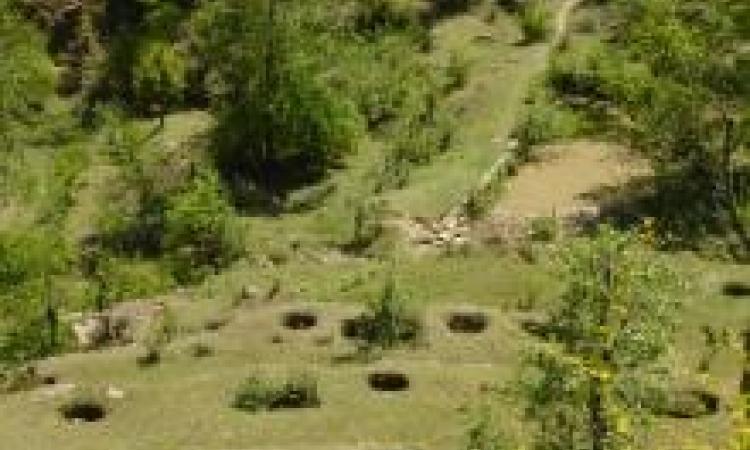
Throughout history, the Uttarakhand Himalayas have been a source of timber and water to the rest of the nation. However, this has led to severe depletion of resources in the state. Today, the mountain communities find it hard to meet their basic needs of fodder, fuel and water.
There have been many small but successful attempts by locals to restore the forests' original bounty to the area. Himantar, a magazine published by PAHAR, a non-profit organisation working in Uttarakhand celebrates in this special issue, many of these attempts including the 25th anniversary of Sacchidanand Bharti's work in Ufrenkhal. Bharti has restored several forests in the area and also caused the birth of a new river now called the Gad Ganga. The articles written in this issue detail the social revolutions happening in the state right now.
The following articles are presented in this magazine:
A new Ganga emerges from Ufrenkhal: Ramesh 'Pahari'
Ufrenkhal, a village in Pauri Garhwal, Uttarakhand, is home to a newly-born river named the Gad Ganga. The soil and water conservation efforts carried out in the area have reduced the rate at which rainwater runs off the slopes. This increases infiltration into the ground, which then increases soil moisture and helps springs recharge.
Adversities provided inspiration: Sacchidanand Bharti
The lives of the villagers in and around Dudhatoli, where Ufrenkhal is located, are stressful because of the harsh terrain and scarce natural resources. The Dudhatoli LokVikas Sansthan, a non-profit organisation, fought these challenges by planting more trees, protecting the forests and recharging springs. The article lists all the members of the society.
An experimental attitude that inspires
Damodar Singh Rathore has a singular goal. He wishes to plant 1,500 crore plants in his lifetime. This project has greened the forests of Devchula in the Garhwal area of Uttarakhand. Even more inspiring are his choice of trees. He has planted more than a thousand species, often determining the means of successfully growing these plants from seed or cuttings by trial and error. In this article, the author describes the process of creating the 'smritivan' or 'memorial forest' and the benefits it has has to the water sources in the area.
Our resources, our management
Mohan Kandpal is known in Dwarahat and Bhikiyasain blocks in Almora district, Uttarakhand as the 'paryavaran wale massahab' (the teacher who works for the environment)'. Over the last two decades, he has worked towards self-sufficiency in fodder and fuel by planting trees and grass in forests, van panchayat land and the village land. Doing this through 'Mahila Mangal Dals' also helped the women form a collective voice in the decisions of the village. This article explains both the process and the impacts of this endeavour.
Save our seeds campaign
This campaign, as did many others in the mountain areas, was born of the Chipko movement. The campaign aims to increase the self-reliance of farmers and reduce their dependence on commercial seed suppliers. It encourages them to sow, collect and exchange traditional varieties of crops rather than purchase hybrids. It has now succeeded in ensuring the survival of several varieties of food crops which would otherwise have been lost. In addition to saving traditional varieties, it also strives to ensure the survival of traditional methods of cultivation such as the use of organic fertilisers and pesticides.
A 'Junglee's' jungle: Prabhat Upreti
Jagat Singh Chaudhari has successfully grown 56 varieties of trees in the forest in Kotgaon, along the Rishikesh-Badrinath highway . These trees number more than ten thousand at present. In addition to these, he has also planted, flowers, herbs, grasses and creepers. He has also organised a march from Gauchar in Chamoli district of Uttarakhand to Delhi to promote mixed afforestation and talk about the benefits of forests.
The return of a community's self-respect: Puran Bhist
Sacchidanand Bharti caused a revolution in Ufrenkhal by focusing not just on water, but by mobilizing entire communities and bringing them together. The successful rejuvenation of the springs further strengthened the villages' confidence in their abilities. Bharti's dreams for the future of the mountain villages has them as being places of plenty, where there is no shortage of food, water, forests or education.
The conservation efforts initiated by locals are slowly getting sure hold in the region. The work done in Ufrenkhal and Kotgaon, in Dwarahat and Dharchula, are now being replicated in several smaller efforts throughout the state. This effort may well revitalise the state and keep alive the traditional way of life in its forest-dependent villages.
/articles/celebrating-uttarakhand